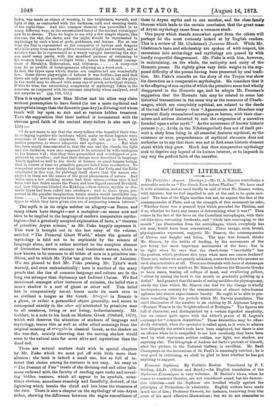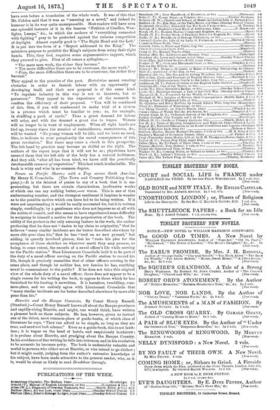Economic Sophisms. By Frederic Bestial. Translated by P. L Stirling,
LL.D. (Oliver and Boyd.)—An English translation of the Sophisnies Econotnigtees is very welcome. M. Bastiat's views, when he comes to construct theories, are not considered sound, but his destruc- tive criticism—and the Sophisms are levelled wholly against the principles of Protection—is admirable. English writers have made much use of him ; Professor Fawcett, for instance, borrowing from him some of his most effective illustrations ; but we do not remember ts have seen before a translation of the whole work. It was of this that Mr. Cobden said that it was as "amusing as a novel," and indeed its humour is in its way quite unsurpassable. Most readers will have seen one splendid instance of it in the famous "Petition of Candles, Wax- lights, Lamps," &c., in which the makers of "everything connected with lighting" pray to be protected against the ruinous competition of daylight. Almost equally good is "The Right Hand and the Left.' It is put into the form of a "Report addressed to the King." The ministers propose to prohibit the King's subjects from using their right hands. This, they feel, requires some argumentative support, which they proceed to give. First of all comes a syllogism,—
" The more men work, the richer they become." "The more difficulties there are to be overcome, the more work." "Ergo, the more difficulties there are to be overcome, the richer they become."
They appeal to the practice of the past. Restriction meant creating obstacles in order to furnish labour with an opportunity of developing itself, and their new proposal is of the same kind. "To regulate industry in this way is not to innovate, but to persevere." They appeal to the experience of the monarch to
confirm the efficiency of their proposal. You will be convinced of this, Sire, if you will condescend to make trial of a system in a process which must be familiar to you ; as, for example, in shuffling a pack of cards." Thus a great demand for labour will arise, and with the demand a groat rise in wages. Women will no longer be in want of employment. When all right hands are tied up, twenty times the number of embroiderers, seamstresses, &c., will be wanted "No young woman will be idle, and we have no need, Sire, to indicate to your perspicacity the moral consequences of this great revolution." But there may come a check to this prosperity. The left hand by practice may become as skilful as the right. The authors of the report hope that it will not be so ; physicians have assured them that the left side of the body has a natural feebleness. And, they add, "after all has been tried, we have still the practically inexhaustible resource of amputation." This last touch is admirable. The book is witty and wise in no common degree.































 Previous page
Previous page